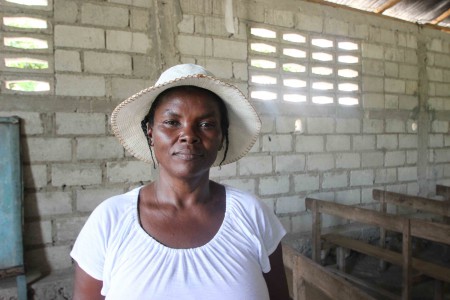
Today my friend Jonathan Merritt releases his new book, Jesus Is Better than You Imagined. He graciously allowed me to share an excerpt with you about a trip we took to Haiti to visit HOPE’s work. This section follows a description of how we were held at gunpoint by bandits on our way back to Port-au-Prince. One of the most unsettling experiences in my life, I was impressed by Jonathan’s calm response and the way he processes our trip in his new book.
• • • Being held at gunpoint by bandits wasn’t the most memorable part of my trip to Haiti. Not by a long shot. A few hours outside of Port-au-Prince, HOPE had several “savings circles,” or community cooperatives where groups of individuals pool their money to make low-interest loans and save for essential purchases or start businesses. Each group elects a president, vice president, secretary, and treasurer to help oversee the process.
In Haiti, when they bury the dead, the last step is to crack the coffin door so grave robbers won’t dig it up and resell it. In such a context, any extra money left after one pays the bills has a way of vanishing. The needs of others in the community tug at every spare penny. Savings circles provide intercommunity accountability for how money is stewarded.
A fifteen-year-old boy told me through a toothy grin that he was saving to go to college and become a doctor one day. A middle-aged woman told me that she’d saved up over the last year to buy a pig and a new door for her house. In the coming year, she plans to use the money to add on to their family’s home. And perhaps most memorable, one portly man said, “Before I joined this group, my extra money passed through my stomach. Now I’m saving it and making a better life for my children.”
In addition to the economic value, there are social and spiritual benefits. Social circles provide a network of encouragement. If members are discouraged, the others work to lift their spirits. When a member is sick, the others visit. In one group, I heard a story about a member’s mother who passed away, and the group used some of their interest earnings to support the family. One woman said she’s learned about transparency and honesty. Another that he has learned to support his friends and put God first.
After darkness settled one evening, Peter and I visited a savings circle meeting in a rectangular church that lacked electricity. The group sat in the first pews, and facing them, the treasurer tallied the week’s deposits. A young boy held a flashlight over the treasurer’s shoulder. This seemed a metaphor for what community cooperation was becoming in this country— a beam of light in a sea of darkness.
When the meeting concluded, I chatted with a few of the members.
One man handed me a business card for Salem Tires with bold letters: vital alexander, manager.
“That’s me,” he said, grinning wide.
Another man named Derek told me that he used to be a beggar, and felt that everyone looked down on him. Today, he rides a bike to a business he owns. When people look at him now, he says, their eyes are different. Like Vital’s, Derek’s posture is no longer head down and palms up, but rather shoulders back and chin up.
Peter believes community and economic development programs like HOPE’s can help eliminate extreme poverty from the face of the earth. Unlike charity programs, these solutions offer people dignity, responsibility, and ownership. In Haiti, many people have passions and gifts that go unused, but HOPE empowers them to put their God- given talents to work.
“Christians often patronize people we hope to minister to by telling them that we can do for them because they are incapable of doing themselves,” Peter says. “Instead, HOPE works to remind them that they can do the things they believed they were incapable of.”
Turn on your television or visit a news site and you may hear stories of Haiti— most of them negative and many full of stereotypes. But this island nation is brimming with other kinds of stories. Tales of hope and redemption, reconciliation and progress. People who didn’t have jobs are now gainfully employed. Those who had forgotten how to dream are relearning. Broken relationships are being mended. And the Body of Christ is being built up.
The chasm between a hopeless Haiti and one where dreams are birthed seems wide. As do the gulches between a troubled marriage and a happy one, a fractured relationship and a harmonious one, a calling sensed and one realized.


